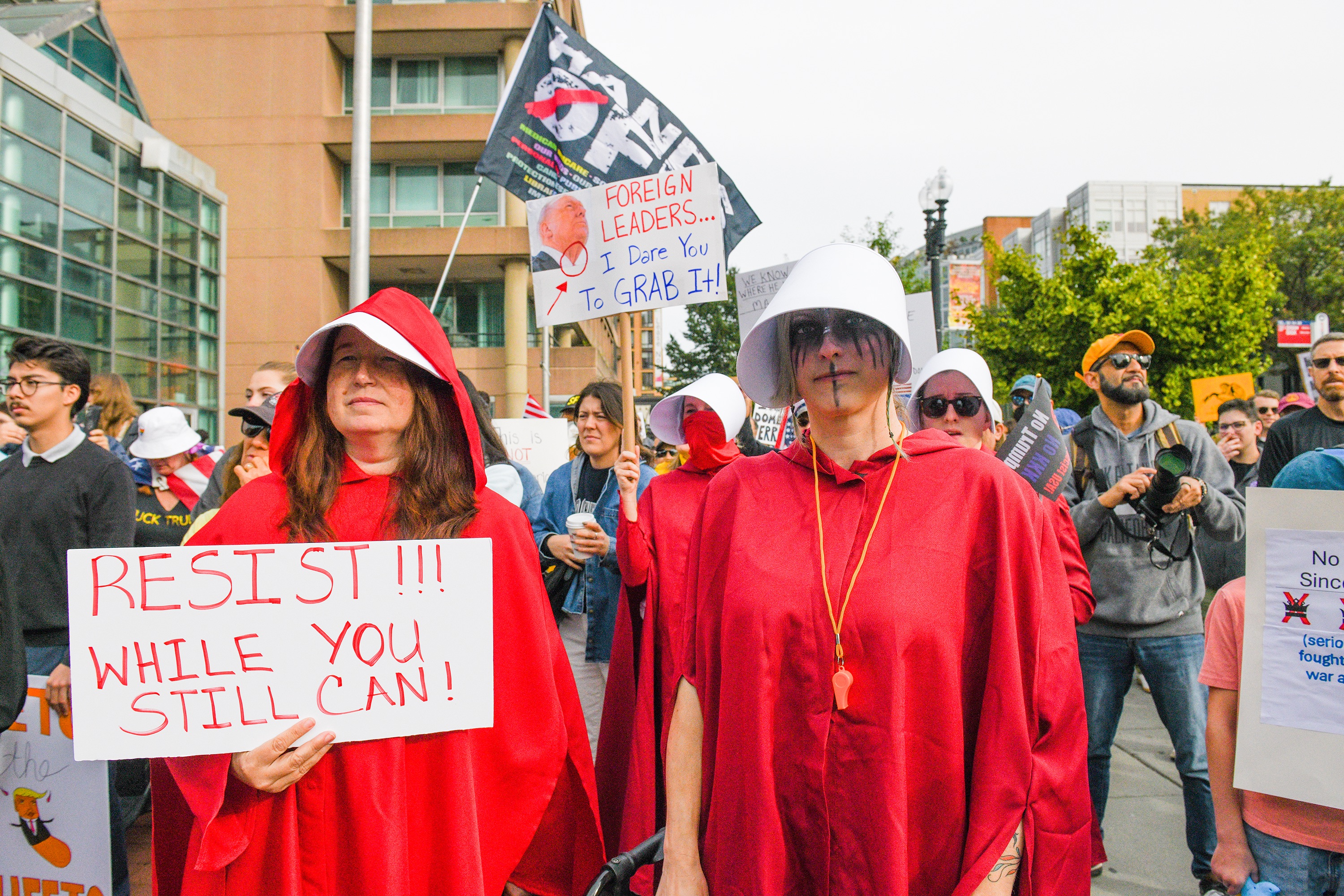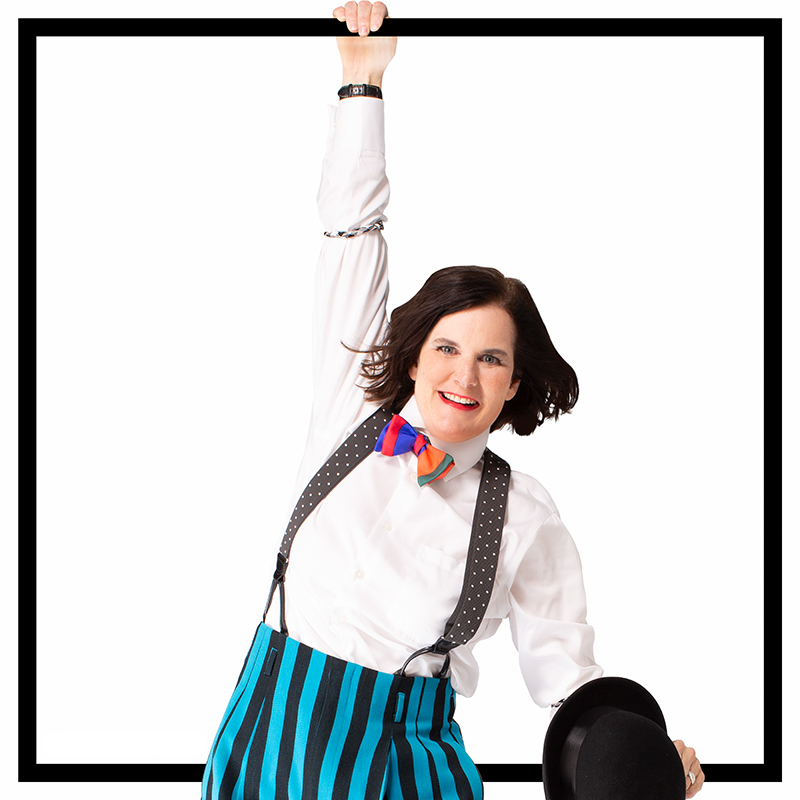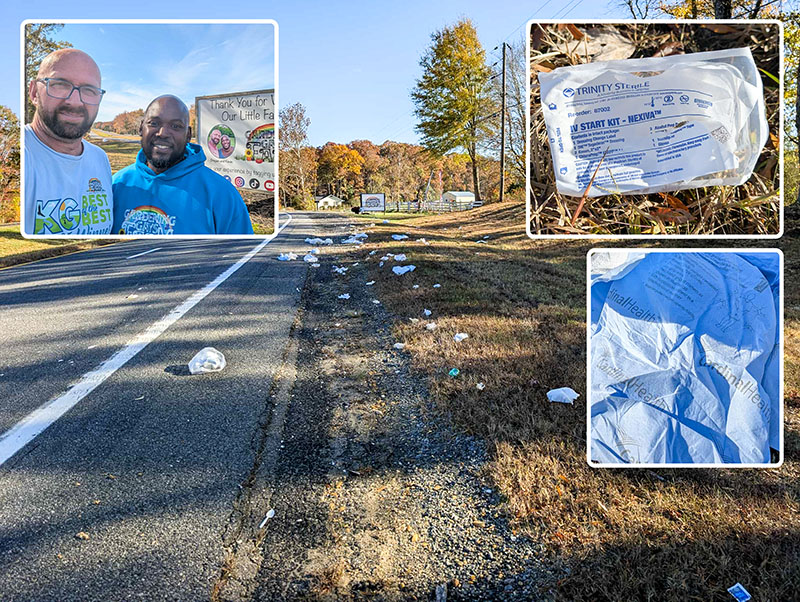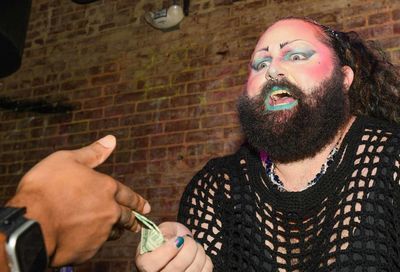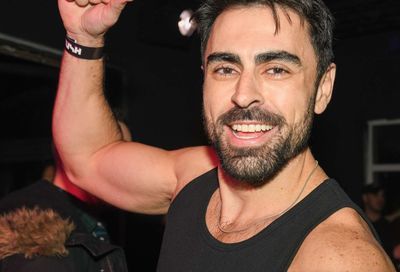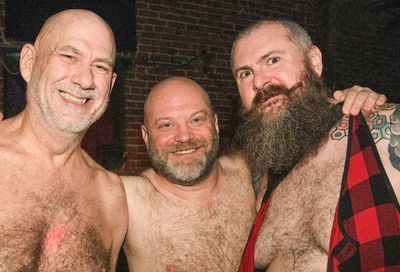Courting the Community
The D.C. mayoral election may be a year away, but for Adrian Fenty it's never too early to start the campaign
The first in an occasional series of interviews and stories on the 2006 D.C. mayoral and Council races.
You may be tempted to think that the race for D.C. mayor is a long way off. You’d be wrong.
While the actual primary and general elections for 2006 aren’t scheduled until late next year, the campaign machinery has already shifted into gear, particularly now that Mayor Anthony Williams has decided not to seek another term. But where others may be shifting into the first or second gear, Adrian Fenty already seems well into fourth and heading into overdrive.
The energetic 34-year-old city councilmember from Ward 4 has been a consistent presence at events throughout the city in his quest for the mayor’s office. And he’s made a point of courting the gay and lesbian community — the earlier, the better. And while most candidates will court the community in this heavily Democratic city, Fenty has already garnered the support of a number of community business leaders and activists.
A product of D.C., Fenty’s long-time political ambitions bore fruit in 2001 when he unseated Charlene Drew Jarvis to represent Ward 4, where he lives in Crestwood with his wife and twin sons. Moving from upstart to incumbent, he won a second term in 2004.
 Fenty |
In this exclusive interview, Fenty talks about his experience with the gay and lesbian community, what he hopes to accomplish if elected mayor, and how he believes overcoming divisions is a key to the city moving forward.
METRO WEEKLY: You were born and raised in the city. What neighborhood did you grow up in?
ADRIAN FENTY: I grew up in Mt. Pleasant. It was a great D.C. neighborhood then and a great one now. Lots of kids. I went to the local elementary school, so I knew everybody in the neighborhood.
MW: When you were growing up, what was your first awareness of the gay and lesbian community in the city?
FENTY: Probably when my parents opened their store [Fleet Feet, in Adams Morgan] in 1984. I was about 13 or 14. The D.C. Frontrunners [a gay running group] were around, and without any question I knew of them, and I ran with a lot of the guys and gals. The family business has been in Adams Morgan for 21 years. They’ve always been very active, and there’s always been an interaction with the community.
MW: Was there any difficulty for you in terms of being comfortable with gay and lesbian people?
FENTY: Never, never. One of my cousins was a lesbian, and I knew that pretty early, too. I think [my comfort level] goes back to having to work in the store at such an early age. There were customers from all different backgrounds coming in, especially members of the GLBT community.
MW: Over the past few months, you have been to many, many gay and lesbian community events, and you seem to be courting the gay community pretty heavily in your campaign. How big a part does focusing on the gay community play in your campaign?
FENTY: No question about it, we think that a mayor who connects with the GLBT community is a huge priority and it has to be on our agenda on a daily basis. But I’ve tried to keep that philosophy and approach since day one as an elected official — working with the community to make sure people feel welcome and that their views are being represented. And, of course, since I’m a mayoral candidate we try to be at every event, GLBT and otherwise. I want to be a good elected official.
MW: You have a big geographic ward that encompasses a diverse range of neighborhoods. Particularly with the changes in neighborhoods such as Columbia Heights and the opening of the Metro in that area, are you seeing growth in the gay and lesbian community throughout your ward?
FENTY: I would say yes. I think it’s growing, and a strong part of the district’s fabric at this point, and that’s a good thing.
MW: I want to ask you about gentrification, because that’s an issue for people getting priced out of their neighborhoods. The gay community has sometimes gotten drawn into that because a lot of gay and lesbian couples buy houses in ”up and coming” neighborhoods and fix them up. Has that caused conflicts in terms of trying to manage different issues in those particular neighborhoods?
FENTY: That’s a good question, but I would say no — and pretty unequivocally. I haven’t heard of any conflict between the GLBT community and the straight community as a result of gentrification. That being said, obviously the second biggest crisis in the city after fixing the schools is affordable housing. So it’s an issue no matter what member of the community you are, no matter what race you are. At this point even people with professional degrees are having a hard time finding housing. So the more the city can do for that, whether it’s strong rent control laws or inclusionary zoning, we’re going to be able to make this a diverse city in the future. You can take the neighborhood where I moved, Crestwood: The houses have gone up [in price] about four or five times since we moved in in late 1997. I think there’s probably a whole group of people who have moved in, from all different backgrounds and demographics — and that’s probably true for the people who moved out.
MW: When did you first know that you wanted to go into politics?
FENTY: High school is definitely when I first developed a passion for politics. I guess it was in some American history course or something where I started to look at what presidents and Congress did and I knew that was very interesting to me. So, as I went to Oberlin and then to law school, I kept that as my focus. I tailored all my internships and my law degree towards getting involved in public policy and law making. When I became a homeowner in the city, I started thinking about the local part of politics. Before that, I really had been thinking of national politics — I had done a couple of internships on Capitol Hill. But when I started thinking locally, I got involved in a civic association, an Advisory Neighborhood Commission, the 1998 mayor’s race — I got deeper and deeper into it. I love the city, I love politics, I love public service. I couldn’t imagine being an elected official anywhere else. So I’m very satisfied with what I’m doing now and with what I’d like to do as mayor.
MW: What’s the main reason that you want to run for mayor?
FENTY: The No. 1 reason is to help the city achieve its potential. The city has come a long way, but we have a long way to go. It’s time to have someone who’s going to roll up his sleeves, work 24 hours a day, hold people accountable, and come in with a sense of urgency. Given the foundation that’s been built, we can really take the city to the next level with excellent schools, excellent community policing, making sure that we’re bringing everybody into the renaissance of the city. The reason I like public policy in the first place is because it is really public service. That’s the part of it I come back to every time. I like being able to help people.
 |
MW: One of the things in the news right now is that the city has begun exercising its eminent domain over the baseball stadium area properties in Southeast. In terms of the businesses that are being displaced, what should the city be doing?
FENTY: The law sets up requirements for relocation and for business assistance. But I think that’s the minimum we should do. As a son of a small business owner, it’s pretty unimaginable to have somebody come in and not only take your property but to take your business as well. It’s an unimaginable thing for us to be asking these businesses to do, so I think we need to be bending over backwards to try to find them a location, try to assist them…, and for any day they’re that closed we make up the profits.
MW: How should the city handle the zoning restrictions that restrict where some of those businesses — in particular those with nude dancing licenses — may relocate?
FENTY: Currently, the only place you can move a nude business license is in the downtown core, which is fine if you can find a place, but it’s going to be extremely difficult. One, because most of downtown is spoken for, and two, because the rent the business would have to pay would be a lot more than they’re paying right now. The stage we should be in [is] finding a new location somewhere in the city where the businesses can relocate. I think there are some. I don’t want to say specifically where, because that’s up to the community process, but I’m committed to making sure as someone running for mayor that it would be somewhere in the city and that we would work with the GLBT community to make sure that it’s a location that’s accessible and welcoming.
MW: Some property owners in that area, in both the gay and non-gay businesses, have talked about the appraisal of their property and what the city is planning to pay them. Do you feel that the city is approaching that fairly? Should the city be paying more for those properties?
FENTY: I think the city will pay more. I do. I think that there is probably some negotiating strategy [on the part of the city], because they are obviously undervalued and I don’t think we have even taken into account the [value of the] actual businesses. We’ve just taken into account the property values. So we’ve got a long way to go. I just hope that strategy doesn’t backfire because the negotiations have to be done quickly. In the end, we need to pay fair market value, not only for the property but for the business.
MW: What are your thoughts on the rift between Rev. Willie Wilson and the local black GLBT community, after Wilson’s anti-gay comments?
FENTY: Very simply, these statements are reprehensible. You cannot go around saying that women cannot make more than men and if they do they’re more susceptible to being lesbians and that lesbianism is bad. I do not think anybody should make statements like that about any group of district residents. It’s very divisive, obviously. In the end, I’m not sure what purpose it served because it ends up further dividing us. We’ve got a lot of other hurdles to make this city great. I think that creating pockets of division is not helpful. I think that’s a part of the district’s past. We want to move forward now.
MW: How do you think we may be able to get some resolution to that and bring people back together?
FENTY: I do hope that there can be some meeting of the minds. There are always opportunities to educate people and to come together. I think that cooler heads should prevail and we should try to bring people together as much as possible. It would be for the best interest of the city in the long run.
MW: What role does religion play in your life, if any?
FENTY: I believe in God and Jesus Christ, but I did not grow up going to church every Sunday. I went to Catholic school for two years, mostly because it was a small school. I’m personally religious and I take religion very seriously, [but] I haven’t had a long-term relationship with any specific church.
MW: One ongoing issue is gay marriage. Whoever is mayor for the next few years is going to have to deal with it multiple times from various angles. What’s your personal opinion on gay and lesbian marriage? Is it something you support?
FENTY: Absolutely, I do. Without any question I support laws that would sanction gay marriages and civil unions, domestic partnerships, whatever you want to call it. I think the only people who think like I do but want to slow things down are people who fear retribution from Congress. I don’t know where that debate is going to go. I understand that some members of the GLBT community are fearful of retribution by Congress. Whether we should be fearful or not is one thing, but there is no question that Congress will do something [if a law passes].
MW: You would be willing to sign something even if Congress said it would take action against the city?
FENTY: Absolutely. We are American citizens. Congress has no place getting into any law that we pass. I think we should do it in this case and I think we should do it in other cases like the commuter tax, where Congress tries to prevent us from passing laws that have nothing to do with them.
MW: It sounds like you’d be willing to take a more confrontational approach with congress in terms of its relationship to the district.
FENTY: I believe that for democracy, and for rights in general, there has to be confrontation. We have a group of American citizens right now called the United States Congress, who are preventing us from having the same rights that they have and everyone else who lives in this country has. We have to be upset about it and I think this is a popular view, too. People talk about a lot of things, but when they talk about voting rights in the city and getting Congress off our backs, they are in favor of more confrontation.
MW: What do you see as the ultimate solution to that? Statehood?
FENTY: I support statehood. Absolutely.
MW: Do you think that’s achievable within the foreseeable future?
FENTY: People tend to think of it as something that will never happen, but I remember when I started college there was apartheid in South Africa and no one thought it would ever go away. Things that look impossible can happen. It takes the right alignment of the moon and stars, but I think it will pass that those stars will align for us, so we always have to look for an opportunity. Part of that opportunity is just aggressive lobbying. And as mayor I think I can lobby Congress on a day-to-day basis trying to get people to support the ”No Taxation Without Representation Act.”

Fenty at the 2005 Capital Pride Parade
MW: In the D.C. gay and lesbian community, a lot of the political calculus that’s been done on whether to pursue gay marriage locally comes down to the possibility of political punishment from Congress. Do you consider that a real threat, in terms of negative consequences such as loss of funding that the city needs for certain things?
FENTY: I think Congress would certainly try to do something short-term. Whether it’s the majority of Congress or just a few members, I really don’t know right now. I think that whatever the district decides, we should stand our ground. If Congress does do something, I think it would expose the national hypocrisy. But the one thing I said that I think is very important is that I’ve listened to the debates in the local GLBT community. I understand that people do not want us to go far out on a limb either to prove a point or to be confrontational and then for it to upset their lives.
MW: In the marriage debate, there are many arguments about the purpose of marriage. What do you think marriage is for?
FENTY: Marriage is a union of two people who love each other and want to acknowledge, legally or symbolically, that union to the greater community. One of the reasons that I have no reservations on this issue is that I know that in the past prohibiting people from getting married has been a way to discriminate against people unnecessarily and unfairly. In the 1960s in Virginia, people of different races couldn’t marry. So it’s an additional way — and one very important way — for the majority to discriminate against minorities.
MW: I want to ask you about HIV/AIDS in the district. There have been some changes in leadership at the D.C. HIV/AIDS Administration, following much criticism of the agency’s management and its ongoing problems working with community-based organizations that provide critical services. How do you think things are moving on that front now?
FENTY: It’s a good thing we’re getting rid of people who aren’t getting the job done. [New HAA director Marsha Martin] has only been on it for two months, so it’s a little soon to know from a management perspective how she is doing. I would say that this city has a long way to go, but I have a lot of confidence in the councilmembers who are on the [Council’s health committee] and the chair of the committee to try and hold the executive accountable.
MW: The city has been working with Whitman-Walker Clinic to help stabilize its finances. Some other HIV/AIDS organizations — African-American community groups, youth groups, and others — have been like, ”Hey, we’re having financial problems, too. Why isn’t the city stepping in to help us?” If you were mayor, how would you approach that situation?
FENTY: The short answer is that you want to approach that situation thoroughly. Whitman-Walker needs more funds and these groups obviously need more funds. We are not currently funding our prevention and intervention the way we should. I think establishing more local grants is the short answer. Try and make sure that we have organizations that are working in some of the areas where there is not a lot of discussion about HIV/AIDS, such as in the high schools. The discussion is not allowed in high schools and it should be, given the demographics and people who are contracting the disease.
|
MW: I know that the school system is a big part of your campaign. How do you see the gay and lesbian community interacting with schools? Do you feel the school system is a place where gay and lesbian youth can feel safe and accepted right now, or are there things that should be done for that?
FENTY: There are certainly a lot of young GLBT people in high school. I’ve been to a couple of events by SMYAL [the Sexual Minority Youth Action League] over the past couple of years and they have spoken pretty candidly about the difficulties that young gay and lesbian members face in their schools. Yes, there has to be interaction at the school level to make sure that these students feel comfortable with their own sexuality in the school. The various obstacles will have to be looked at. Some of it is personal [for the students], some of it is the kids discriminating among themselves. I think that can be addressed in education or discussion. Obviously, there’s a role for the government there. The schools should have teachers and administrators who are well-trained in sensitivity.

Fenty at the 2005 High Heel race
MW: What do you say to a gay, lesbian, bisexual or transgender person who asks why they should want you to be mayor?
FENTY: I think I have a record of unequivocal support and advocacy for the GLBT community since I’ve been on the City Council. We have a number of people who are working with us throughout the city, staunch members and staunch supporters of the active participants and progressive values that I think are important to the GLBT community. The issues are important for the community itself, but [also] tangential issues such as being pro-choice, fighting for affordable housing, good health care, good education. I have a record of doing all of those things. The reason a lot of people are supporting us — and I am certainly humbled and appreciative of their support — is that they are ready for the city to move forward. If we can build on what we’ve accomplished over the past seven years with some new ideas, new energy and new vision, we’re going to maximize the potential of the city.
I think people see me as a straight shooter. I believe that gay marriage is right and you aren’t going to be able to deter me on that. Let the chips fall where they may. I think that people who are discriminated against want to have somebody in office who is going to fight for them, who’s going to stand up for what they believe and what the community believes in. I do believe that this city is a city of inclusiveness. I don’t think there’s any room in this city for us to go backwards by continuing to divide the city.
Support Metro Weekly’s Journalism
These are challenging times for news organizations. And yet it’s crucial we stay active and provide vital resources and information to both our local readers and the world. So won’t you please take a moment and consider supporting Metro Weekly with a membership? For as little as $5 a month, you can help ensure Metro Weekly magazine and MetroWeekly.com remain free, viable resources as we provide the best, most diverse, culturally-resonant LGBTQ coverage in both the D.C. region and around the world. Memberships come with exclusive perks and discounts, your own personal digital delivery of each week’s magazine (and an archive), access to our Member's Lounge when it launches this fall, and exclusive members-only items like Metro Weekly Membership Mugs and Tote Bags! Check out all our membership levels here and please join us today!







